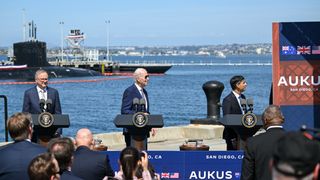The Australian Labor Party is firmly committed to the AUKUS nuclear-powered submarines, at least according to the unopposed motion passed at last week’s ALP National Conference. But the small yet vocal opposition throughout the conference makes clear that pushback against the partnership is only growing.
Multiple polls show that public support for the AUKUS security partnership between Australia, the United Kingdom and the United States has fallen below a majority of Australians. Labor’s internal debates serve as a harbinger for the prospect of more concerted opposition. Just as businesses must earn and maintain a “social licence to operate” from their stakeholders, governments too must seek the social licence necessary to sustain AUKUS over generations. As Maria Rost Rublee observed, the nuclear component of AUKUS in particular demands community consent. But this social licence challenge extends to the enterprise as a whole.
Since the announcement in March 2023 setting out the expected pathway for Australia to acquire the nuclear-powered boats, the Foreign Policy and Defence Program at the United States Studies Centre has interviewed dozens of industry representatives, union members, engineers, educators, naval personnel and others in Australia whose support will be necessary for the submarine endeavour’s success.
Much of the front-page criticism of AUKUS to date has focused on questions of sovereignty, alliance obligation, military entrapment, the risks of nuclear proliferation and nuclear waste disposal.
Much of the front-page criticism of AUKUS to date has focused on questions of sovereignty, alliance obligation, military entrapment, the risks of nuclear proliferation and nuclear waste disposal.
Many of the stakeholders we spoke to share these concerns. But they are also worried about what AUKUS will mean for Australia’s shipbuilding future.
Nuclear stewardship is a priority for many. Labor’s initial conditions in September 2021 that AUKUS would not lead to a domestic nuclear energy industry nor the acquisition of nuclear weapons have so far been insufficient to assuage local party branches. Such concerns have intensified in recent months following the Coalition’s push to overturn its longstanding official position against nuclear power.
Unions, in particular the Electrical Trades Union and the Australian Manufacturing Workers’ Union, have also been vocal in reiterating their opposition to nuclear energy. Though Western Australian workers have offered tentative support for AUKUS so far, the state’s unions have historically harboured some of the strongest anti-nuclear sentiment in the country.
Similarly, the disposal of highly-enriched uranium and construction of an east coast submarine base are key sticking points. Just as the recent High Court ruling against the storage of medical-grade radioactive waste in South Australia showed, when a site is eventually selected, it will galvanise intense opposition and protest.
All state governments have pre-emptively ruled out hosting the waste, and community opposition to hosting an east coast submarine base is increasing.
On job creation and workforce benefits, Prime Minister Anthony Albanese has presented AUKUS as the “most transformative industrial endeavour in Australian history” that will deliver 20,000 “well-paid, union jobs”. The federal and state governments have committed $150 million for workforce expansion. But this could be overwhelming for the relatively small number of vocational education and training providers in Adelaide and Perth, where the majority of the workforce is expected to be located.
Meanwhile, industry representatives have voiced concerns about whether the government is doing enough to avoid a “valley of death” that would limit the commercial support required for AUKUS to succeed.
Building and sustaining the social licence for AUKUS in Australian workers’ eyes is critical, especially when the benefits cannot be equitably distributed across the country. The National Reconstruction Fund will only impose further workforce demands on technically adjacent industries such as mining and clean energy where many core shipbuilding skills currently exist.
Australia is grappling with a cost-of-living crisis, an energy crisis and post-Covid debt repayments. Competing spending demands may steadily undermine the value-for-money justification for AUKUS.
As it stands, concerns are growing about a “furious race against the clock” to find the estimated 8,000 engineers needed for AUKUS. Given industry reports that almost 60 per cent of Australian engineers are foreign-born, the conditions that government may enforce for security clearances to work within the tri-national enterprise will be contentious, as citizenship requirements are a common part of higher level vetting. In the late 2000s, courts granted Australian defence companies exemptions from anti-discrimination laws in order to work with the US defence industrial base.
Finally, the cost of the endeavour has so far generated the most angst. Both the former and current governments have struggled to clearly make a strategic case for AUKUS. Two years on, the latest Lowy Institute Poll shows only a quarter of Australians think AUKUS justifies the price tag of up to $368 billion. Australia is grappling with a cost-of-living crisis, an energy crisis and post-Covid debt repayments. Competing spending demands may steadily undermine the value-for-money justification for AUKUS.
The Albanese government has worked hard to sell AUKUS internationally, informing more than 60 countries ahead of the March announcement and regularly engaging the International Atomic Energy Agency.
It now needs to devote that same energy to winning over the Australian people. Without engaging in a frank and fearless conversation with the public about why Australia should stay the course with AUKUS, last week’s ALP National Conference may be just a taste of things to come.








